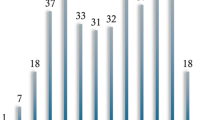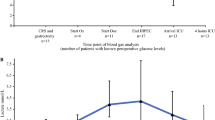Abstract
Background
Cytoreductive surgery (CRS) including gastric resection combined with hyperthermic intraperitoneal chemotherapy (HIPEC) can improve the prognosis of selected patients with peritoneal surface malignancies. Perioperative morbidity of this aggressive treatment strategy is high; however, overall mortality can be low in specialized centers. The aim of this study was to assess the safety of gastric resections with anastomosis during CRS and HIPEC.
Methods
Between 2005 and 2008, 204 patients underwent CRS and HIPEC at our tertiary referral centre. Of these, 37 procedures (male/female 24/13, median age 55 years) included gastric resections. The clinical data of all patients were introduced into a database and analyzed with respect to the morbidity associated with the gastric resections.
Results
Of all patients included, 16 had pseudomyxoma peritonei, 11 gastric carcinoma, 4 ovarian carcinoma, 3 malignant peritoneal mesothelioma, and 3 colon carcinoma. Twenty-seven patients had previous surgery (n = 22) and/or systemic chemotherapy (n = 18). Fifteen total gastrectomies, 3 subtotal gastrectomies, 12 distal gastrectomies, and 7 gastric wedge resections were performed during CRS. The overall postoperative morbidity was 45%; main surgical complications were pancreatitis (n = 6), abdominal abscess (n = 4), bile leakage (n = 2), and digestive fistula (leakage of ileorectostomy and small bowel perforation) (n = 2). However, no complications occurred at the site of the esophageal anastomosis (n = 15), gastric anastomosis (n = 15) or gastric suture (n = 7). No patient died postoperatively during the hospitalization period.
Conclusions
CRS in combination with HIPEC is associated with high postoperative morbidity; however, anastomosis following total or subtotal gastrectomy is safe in experienced centers. No leakages related to gastric resections occurred in this high-risk patient group.



Similar content being viewed by others
References
Sadeghi B, Arvieux C, Glehen O, et al. Peritoneal carcinomatosis from non-gynecologic malignancies: results of the EVOCAPE 1 multicentric prospective study. Cancer. 2000;88:358-363.
Koppe MJ, Boermann OC, Oyen JG, Bleichrodt RP. Peritoneal carcinomatosis of colorectal origin: incidence and current treatment strategies. Ann Surg. 2006;243:212-222.
Sugarbaker PH, Cunliffe WJ, Belliveau J, et al. Rationale for integrating early postoperative intraperitoneal chemotherapy into the surgical treatment of gastrointestinal cancer. Semin Oncol. 1989;16:83-97.
Verwaal VJ, Bruin S, Boot H, et al. 8-year follow-up of randomized trial: cytoreduction and hyperthermic intraperitoneal chemotherapy versus systemic chemotherapy in patients with peritoneal carcinomatosis of colorectal cancer. Ann Surg Oncol. 2008;15:2426–32.
Kusamura S, Younan R, Baratti D, et al. Cytoreductive surgery followed by intraperitoneal hyperthermic perfusion. Cancer. 2006;106:1144–53.
Glehen O, Kwiatkowski F, Sugarbaker PH, et al. Cytoreductive surgery combined with perioperative intraperitoneal chemotherapy for the management of peritoneal carcinomatosis from colorectal cancer: a multi-institutional study. J Clin Oncol. 2004;22:3284–92.
Shen P, Hawksworth J, Lovato J, et al. Cytoreductive surgery and intraperitoneal hyperthermic chemotherapy with mitomycin C for peritoneal carcinomatosis from nonappendiceal colorectal carcinoma. Ann Surg Oncol. 2004;11:178–86.
Hansson J, Graf W, Pahlman L, Nygren P, Mahteme H. Postoperative adverse events and long-term survival after cytoreductive surgery and intraperitoneal chemotherapy. Eur J Surg Oncol. 2008.
Jacquet P, Sugarbaker PH. Clinical research methodologies in diagnosis and staging of patients with peritoneal carcinomatosis. Cancer Treat Res. 1996;82:359–74.
Koh JL, Yan TD, Glemm D, Morris DL. Evaluation of preoperative computed tomography in estimating peritoneal cancer index in colorectal peritoneal carcinomatosis. Ann Surg Oncol. 2009;16(2):327–33.
Sugarbaker PH. Peritonectomy procedures. Ann Surg. 1995;221:29–42.
Glehen O, Gilly FN. Quantitative prognostic indicators of peritoneal surface malignancy: carcinomatosis, sarcomatosis, and peritoneal mesothelioma. Surg Oncol Clin North Am. 2003;12:649–71.
Sugarbaker PH. Laboratory and clinical basis for hyperthermia as a component of intracavitary chemotherapy. Int J Hyperthermia. 2007;23:431–42.
Glehen O, Cotte E, Kusamura S, et al. Hyperthermic intraperitoneal chemotherapy: nomenclature and modalities of perfusion. J Surg Oncol. 2008;98:242–6.
Elias D, Benizri E, Dipietrantonio D, et al. Comparison of two kinds of intraperitoneal chemotherapy following complete cytoreductive surgery of colorectal peritoneal carcinomatosis. Ann Surg Oncol. 2006;14:509–14.
Garofalo A, Valle M, Garcia J, et al. Laparoscopic intraperitoneale hyperthermic chemotherapy for palliation of debilitating malignant ascites. Eur J Surg Oncol. 2006,32:682–85.
Younan R, Kusamura S, Baratti D, et al. Morbidity, toxicity, and mortality classification systems in the local regional treatment of peritoneal surface malignancy. J Surg Oncol. 2008,98:253–7.
Esquivel J, Sticca R, Sugarbaker P, et al. Cytoreductive surgery and hyperthermic intraperitoneal chemotherapy in the management of peritoneal surface malignancies of colonic origin: a consensus statement. Society of Surgical Oncology. Ann Surg Oncol. 2007;14:128–33.
Moran BJ. Decision-making and technical factors account for the learning curve in complex surgery. J Public Health. 2006;28:375–8.
Reuter NP, Macgregor JM, Woodall CE, et al. Preoperative performance status predicts outcome following heated intraperitoneal chemotherapy. Am J Surg. 2008;196:909–13.
McQuellon RP, Danhauer SC, Russell GB, et al. Monitoring health outcomes following cytoreductive surgery plus intraperitoneal hyperthermic chemotherapy for peritoneal carcinomatosis. Ann Surg Oncol. 2007;14:1105–13.
Sugarbaker PH. Cytoreduction including total gastrectomy for pseudomyxoma peritonei. Br J Surg. 2002;89:208–12.
Levine ED, Stewart JH, Russell GB, et al. Cytoreductive surgery and intraperitoneal hyperthermic chemotherapy for peritoneal surface malignancy: experience with 501 procedures. J Am Coll Surg. 2007,204:943–55.
Gusani NJ, Cho SW, Colovos C, et al. Aggressive surgical management of peritoneal carcinomatosis with low mortality in a high volume teriary cancer center. Ann Surg Oncol. 2007;15:754–63.
Elias D, Goere D, Blot F, et al. Optimization of hyperthermic intraperitoneal chemotherapy with oxaliplatin plus irinotecan at 43°C after complete cytoreductive surgery: mortality and morbidity in 106 patients. Ann Surg Oncol. 2007;14:1818–24.
Glehen O, Schreiber V, Cotte, et al. Cytoreductive surgery and intraperitoneal chemohyperthermia for peritoneal carcinomatosis arising from gastric cancer. Arch Surg. 2004;139:20-26.
Hall JJ, Loggie BW, Shen P, et al. Cytoreductive surgery with intraperitoneal hyperthermic chemotherapy for advanced gastric cancer. J Gastrointest Surg. 2004;8:454–63.
Yonemura Y, Kawamura T, Bandou E, et al. Treatment of peritoneal dissemination from gastric cancer by peritonectomy and chemohyperthermic peritoneal perfusion. Br J Surg. 2005,92:370–5.
Yan TD, Black D, Sugarbaker PH, et al. A systematic review and meta-analysis of the randomized controlled trials on adjuvant intraperitoneal chemotherapy for resectable gastric cancer. Ann Surg Oncol. 2007;14:2702–13.
Samel S, Singal A, Becker H, Post S. Problems with intraoperative hyperthermic peritoneal chemotherapy for advanced gastric cancer. Eur J Surg Oncol. 2000,26:222–6.
Glehen O, Osinsky D, Cotte E, et al. Intraperitoneal chemohyperthermia using a closed abdomial procedure abd cytoreductive surgery for the treatment of peritoneal carcinomatosis: morbidity and mortality analysis of 216 consecutive procedures. Ann Surg Oncol. 2003;10:863–9.
Author information
Authors and Affiliations
Corresponding author
Additional information
Pompiliu Piso and Przemyslaw Slowik have contributed equally to this study.
Rights and permissions
About this article
Cite this article
Piso, P., Slowik, P., Popp, F. et al. Safety of Gastric Resections During Cytoreductive Surgery and Hyperthermic Intraperitoneal Chemotherapy for Peritoneal Carcinomatosis. Ann Surg Oncol 16, 2188–2194 (2009). https://doi.org/10.1245/s10434-009-0478-5
Received:
Revised:
Accepted:
Published:
Issue Date:
DOI: https://doi.org/10.1245/s10434-009-0478-5




